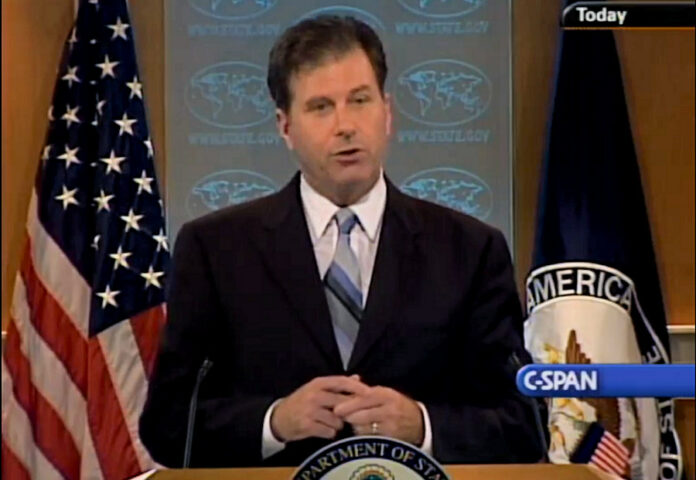
(Part 1)
When Haiti’s de facto Prime Minister Ariel Henry requested a foreign military intervention in September, Montana Group leaders Magali Comeau Denis and Jacques Ted Saint Dic appeared outraged. They accused Henry of treason and refused to continue negotiations, condemning any form of foreign intervention.
This public display of nationalism is at odds with Saint Dic’s previous insinuations.
In an article for Just Security in September 2022, Saint Dic wrote “the United States should use creative and aggressive tactics to intercept criminal activity in Haiti.” This is part of the “powerful and important role” the United States will play “in helping get democracy back on track in Haiti.”
It seems that Montana’s leadership is opposed to a U.S. intervention under Henry but are eager to emphasize Washington’s “powerful and important role” in Haitian affairs once the Montana Group’s interim leaders take power. Saint Dic is clear in his article that “much can be negotiated and concessions can be made” while transitioning to a “Haitian-led” solution to the crisis.
Comeau Denis and Saint Dic have a history of making “concessions” to Washington. Both supported the 2004 coup d’état against Aristide, which also uprooted hundreds of other elected representatives across Haiti.

Former U.S. Ambassador to Haiti James Foley was also actively involved in the coup against Aristide, whom Haitians had democratically elected with 92% of their votes. Foley has now chimed in on the ongoing crisis in Haiti. In a Dec. 1 article published on the Politico website, Foley says Henry “must be prepared to cede power to a transitional government.” He endorses the Montana Accord, proposing a path forward that includes three “interlocking elements.”
The first part of Foley’s plan is an “agreement among Haitians to forge a transitional government on the basis of the Montana Accord.” Second, the Montana group’s interim government must “support an international security mission to assist the Haitian National Police.” Third, Foley insists that the U.S. must participate in the “international force” so it doesn’t “lack credibility.”
Clearly, the U.S. government is done with Henry and the PHTK (Haitian Bald-Headed Party). Washington is demanding that the oligarchs get in line with the new transitional government it is preparing: that of the Montana Group.
Montana’s Ascension is a Prelude to a U.S. Military Occupation of Haiti
An attempt by the Biden administration to pass a resolution for a UN-sanctioned military intervention was blocked by China and Russia, which can be attributed in part to the widespread mass resistance in Haiti (and its diaspora) to yet another foreign invasion.
Washington has been unable so far to persuade other nations to provide soldiers for their proposed “rapid armed intervention force,” which it would like to be “around 2,500 military and police.” CORE group member nations, in particular Canada, are reluctant or unable to organize a large enough military force, although they are trying. Some Caribbean and South American countries like the Bahamas and Guyana have made it clear they are willing to provide soldiers but don’t have enough alone to “stabilize” Haiti.
While Canadian Prime Minister Justin Trudeau has so far demurred from providing soldiers for a force, the Canadian government did announce an “assessment mission” to Haiti a month ago. This appraisal revealed to Trudeau that: “There needs to be a consensus across political parties in Haiti before we can move forward on more significant steps.”
Meanwhile, the U.S. and Mexico are working to draft another UN Security Council resolution to establish “a non-UN, international security assistance mission” for Haiti that the UN would somehow bless. Meanwhile, Canada and other CORE group countries are trying to compel CARICOM to take part in, if not lead, the intervention.
Even BINUH’s Deputy Special Representative Ulrika Richardson, had to admit that despite “a sense of urgency,… most countries remain skeptical about a military intervention in Haiti.”

Reframing the military intervention as “support for Haiti’s police” is a key part of the transition to the Montana Accord. Its interim government might reject an overt large-scale foreign military deployement. But it would likely accept “a company or so… 30 to 60” U.S. Special Forces trainers, as proposed by the Montana-boosting former U.S. special envoy to Haiti, Daniel Foote. This could be cast as simply “supporting the police” and be palatable to Haiti’s small middle class and intelligentsia. (The Vietnam war is the best historical example of how the deployment of Special Forces trainers quickly escalated into an major military occupation and conflict.)
Haiti’s bourgeoisie, meanwhile, continues to call for “recourse to external security assistance… [for] the last time in our history,” in a Dec. 8 open letter.
It was no surprise then that former U.S. Ambassador to Haiti Pamela White in the Dec.2 Washington Post called for the Biden administration to send “2,000 armed law enforcers” to Haiti. To avoid the optics of thousands of armed American law enforcers landing in Haiti, she proposes that the U.S. “send in a couple of hundred at a time, over six months, with little fanfare.”
MINUSTAH – the “UN Mission to Stabilize Haiti” from 2004 to 2017 – was also supposed to help with a “democratic transition” from the Gérard Latortue coup regime installed after Aristide’s Feb. 29, 2004 overthrow to a new elected government. In one July 2005 attack, “peacekeepers” shot more than 22,000 bullets, 78 grenades, and five mortars into the densely populated neighborhood of Cité Soleil. According to Jean Marie Samedi, a grassroots Lavalas leader, MINUSTAH “killed, raped, ransacked” the shantytowns while it “helped all the enemies.” The 2005 attack in Cité Soleil is one crime among thousands perpetrated by the UN against Haitians.
Can Haitians expect the same treatment from a multinational “special armed force” whose “credibility” stands on U.S. participation and support?
The Global Fragility Act and the Montana Group
The U.S. and the CORE group’s manufactured transfer of power to the Montana group is framed as a “Haitian-led” solution to the crisis. Its compliant leadership will soon be awarded diplomatic recognition by Washington and the CORE group. It is a collection of technocrats – a bourgeoisie with no connection to most Haitians, who express agreement with neoliberal policies and U.S. hegemony.
Once installed, the Montana-proposed interim government led by President Fritz Alphonse Jean and Prime Minister Steven Benoît – or the elected government their transition sets in place – will be compelled to negotiate a “security agreement” under the U.S. Global Fragility Act (GFA). This will result in a 10-year U.S. military occupation of Haiti.
The GFA has the support of an array of American think-tanks aligned with the Democratic and Republican parties and enjoys bipartisan support in the U.S. government. Politicians from Donald Trump to Ilhan Omar endorse it. The Canadian government also supports the GFA. The U.S. plans to make Haiti its first GFA “partner.”
The plan to use the Montana leadership to implement the GFA was outlined by Susan Page in an article for the U.S. establishment’s foreign policy flagship, the Council on Foreign Relations (CFR). Page led MINUJUSTH, the UN’s last Chapter 7 mission in Haiti and MINUSTAH’s successor.
The U.S. “should view the Montana Accord as the natural starting point for its new strategic approach for Haiti precisely because it is a Haitian-formulated agreement,” Page wrote. By supporting the Montana Accord, “the United States could rally other bilateral and international partners, many of whom are part of the Core Group that wield enormous power and influence in the country, to work directly with Haitian civil society actors.” Despite some quibbles with it, the U.S. government “should still help Haitians initiate [..] implementation” of the Montana Accord.
Page proposes that “the United States and other partners should begin planning for multiyear development programs” with Montana leadership under the GFA. These “partnerships” will be led by USAID, in coordination with the State Department and Defense Department (DoD).
Under the GFA, these “multiyear programs” are in fact 10-year “planned security assistance” programs. A report by Alliance for Peace Building emphasized the “critical role” of the DoD in the “implementation related to the Global Fragility Strategy” by “ensuring a broad range of security assistance activities” which would enable the U.S. “to successfully execute military objectives by, with, and through its partners in fragile states.”

The Montana Group was likely very pleased, and has made no objection, when the U.S. State Department orchestrated and applauded the UN Security Council’s sanctioning of Jimmy “Barbecue” Cherizier, the leader and spokesman of the “Revolutionary Forces of the G9 Family and Allies, Mess with One, You Mess with All” (FRG-9). As Cherizier says, the bourgeois “civil society” groups which Montana represents are “not patriotic… They don’t love this country.”
Fundamentally, the GFA represents a repackaging of U.S. interventionist policies. Its clauses encouraging input from “local civil society groups” are a facade that will not change U.S. dominance.
A Manufactured “Haitian-led Solution” to the Crisis
The compliant mainstream media in the U.S. and in Canada have begun endorsing the Montana Accord. Amy Wilentz at The Nation describes Montana as a “vast network of Haitian organizations” which support a “Haitian-run solution to the situation.”
The Washington Post shares Wilentz’s fawning support for the coalition, suggesting that Montana’s leadership has a “modicum of popular support” and “deserve[s] a role in determining Haiti’s future; Washington could give them that.”
In an editorial for Le Devoir in Canada, Guy Taillefer argues that the Canadian government should support the Montana Accord, which he describes as a “broad coalition of political parties and civil society organizations.”
All are oblivious to what Montana now represents: Not a “broad coalition,” but a small collection of technocrats eager to embrace Washington’s neoliberal and imperial agenda.
In contrast to Henry’s government, the Montana group can be presented to sectors of the Haitian diaspora and Western mainstream news consumers as a “Haitian-led solution” and a coalition of anodyne “civil society” organizations, which meets the criteria outlined in the GFA. Fundamentally, the Montana leadership’s role is to maintain U.S. hegemony in Haiti by maintaining neoliberal reforms and facilitating “support” for Haiti’s police through “security agreements” under the GFA.
Meanwhile, Saint Dic, a key leader on the Montana Group, is openly endorsing the U.S. government’s “powerful and important role” in restoring Haitian democracy. Montana group leaders continue to show that they are indeed, as Dr. Paul Mocombe described in his discussion with Pascale Robert on the Mau Mau Hour Podcast, a “group of technocrats who are looking to be in the good graces of the CORE group.”
The Haitian people have made clear that they want the U.S. and CORE group nations out of their country. Yet Montana leaders, purported representatives of Haitian “civil society,” are embracing a solution which entails U.S. military intervention, despite their posturing to the contrary.










